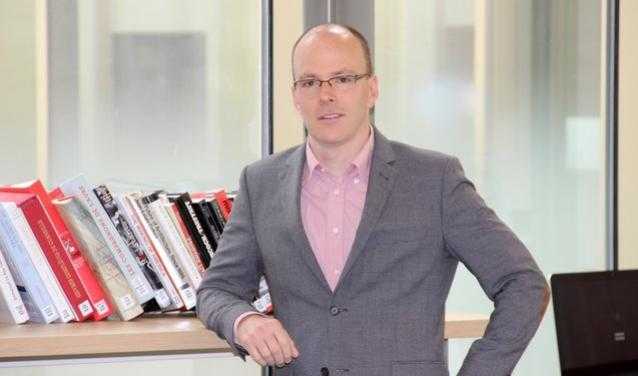Home>“Librarians still play an important role”

24.05.2016
“Librarians still play an important role”
Matthew Baker started his career travelling the world for work. After leaving his home state of Michigan, he spent time in Belgium, England, Canada, Ethiopia and Switzerland before finally coming to Reims in 2012. He talked to us about his current role as head librarian on the Sciences Po campus in Reims.
We often describe young people today as the "digital generation" for whom internet has taken over from books, but libraries certainly haven't been deserted. Why do you think students still need to work at the library?
I think this is a digital generation in many ways, primarily for social activities, sharing information, etc. However, students still seem to prefer printed text when reading in more detail, for example when conducting research or reading something they will need to remember. When given the choice between an e-book and the same title in print, students very often choose the print copy. Technology will evolve and make reading on-screen easier, in which case we will eventually see very different usage habits. Libraries need to keep pace with these changes to offer information in the format that best suits student needs.
In addition to looking for books and other information, students come to the library to find a quiet space to study or work in groups, and for the personalized support offered by librarians. This will remain an important part of students' experience with the library despite changes in technology altering how information is used.
As a librarian, has your role evolved over the years?
The major change I’ve seen as a librarian is the increased availability of online resources. This has altered the librarian's job, because students are increasingly autonomous as information becomes easier to access. Librarians still play an important role in helping students find the information they need, however, and this does not depend on the format in which the information is found. It remains a fundamental role of the library, which I think will continue despite future changes in technology. The information itself remains the same, whether found in print or online format. It's up to librarians to keep on top of these changes to better understand how they can serve student needs.
You seem to be a real star on the Reims campus – the whole student body sings your praises! How do you explain your popularity?
There’s a great group of students on the Reims campus, and it is a real pleasure to work with them. I would be honoured to think that the feeling is mutual.
It's important to mention that I, and my colleague on the Reims campus, represent a much larger library based in Paris comprising many people who work to make this service function smoothly. Our role is to help students use the library's services, and this is the culmination of the work of many people.
Have you always been a librarian or were you the hidden brother of Prince Albert of Monaco in another life? Seriously though, what led you to being a librarian?
I’m often mistaken for Prince Albert, and I wonder how I would be received in Monaco were I to go there [laughs]. There’s no family link between us, despite the resemblance.
I haven’t always been a librarian. I started my career as a journalist before working on an environmental project with the UN. I enjoyed using the library when growing up, which is where I think most librarians begin. I sometimes regretted not having become a librarian after finishing my initial studies in history and international relations, and when I came to a point at which I considered going back to study, becoming a librarian seemed to be the obvious choice. I haven’t looked back since.
Summer break is on its way. Is there a “must-read” book you particularly loved and would recommend?
My favourite authors include Milan Kundera and Naguib Mahfouz. I’ve started reading more African literature lately since the library has been buying more in this area after the Europe-Africa programme moved to Reims. A classic is "Things Fall Apart" by Chinua Achebe. Other good ones are "Jazz et vin de palme" by Emmanuel Dongala or "Lumières de Pointe-Noire" by Alain Mabanckou. Otherwise, "Master and Margarita" by Mikhail Bulgakov is a good summer read, "Bell Jar" by Sylvia Plath, "Mon coeur à l'étroit" by Marie NDiaye, or for a good spy novel, "The Spy Who Came in from the Cold" by John Le Carré.
Related links